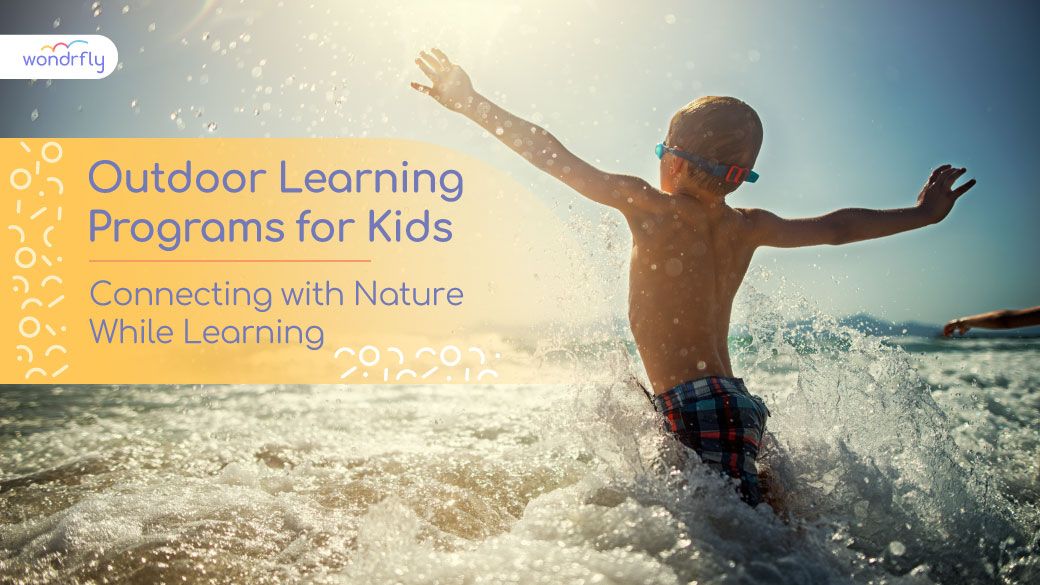In today's fast-paced, technology-driven world, finding ways to connect children with nature is more important than ever. Outdoor learning programs for kids provide an invaluable opportunity to blend education with the wonders of the natural world. By integrating nature science education into these programs, children can develop a deeper appreciation for the environment while engaging in hands-on, experiential learning.
Here, Wondrfly explores the benefits and structure of outdoor learning programs for kids, with a special focus on nature science activities for preschoolers.
The Benefits of Outdoor Learning Programs for Kids
Outdoor learning programs for kids offer a myriad of benefits. First and foremost, they help children build a strong connection with the environment. Being outdoors encourages curiosity, creativity, and a sense of wonder, all of which are essential components of effective learning. Additionally, these programs promote physical activity, which is crucial for healthy development.
Nature science education is a key component of outdoor learning programs for kids. By teaching children about ecosystems, weather patterns, plant biology, and animal behavior, these programs instill a sense of stewardship for the environment. Furthermore, outdoor learning fosters critical thinking and problem-solving skills. When children engage with nature, they are often faced with real-world challenges that require innovative solutions.
The Importance of Outdoor Learning Programs for Kids
Outdoor learning programs for kids are not just about fun and games; they are crucial for holistic development. These programs provide a unique platform for children to explore the environment, develop critical thinking skills, and enhance their physical health. Nature science education, a core component of these programs, helps children understand ecological systems, the importance of biodiversity, and the impact of human activities on the planet. By engaging with nature, kids learn to appreciate and protect their environment, fostering a sense of responsibility and stewardship.
Nature Science Education: A Gateway to Lifelong Learning
Nature science education is an integral part of outdoor learning programs for kids. It goes beyond traditional classroom instruction by providing immersive experiences that bring scientific concepts to life. Children learn about plants, animals, weather patterns, and geological formations through direct observation and experimentation. This hands-on approach not only makes learning more enjoyable but also helps children retain information better.
For instance, instead of reading about photosynthesis in a textbook, kids can observe it in real time by examining leaves and understanding how sunlight, water, and carbon dioxide interact to produce oxygen and glucose. Such interactive lessons foster curiosity and encourage kids to ask questions, setting the stage for lifelong learning.
Engaging Nature Science Activities for Preschoolers
Preschoolers are at a perfect age to start exploring the natural world. Nature science activities for preschoolers are designed to be simple yet profoundly educational, nurturing their innate curiosity and eagerness to learn. Here are some exciting activities that can be incorporated into outdoor learning programs for kids:
- Bug Hunts: Bug hunts are a fantastic way to introduce preschoolers to the world of insects. Equipped with magnifying glasses and bug containers, children can explore gardens, parks, and forests to find various insects. This activity teaches them about insect habitats, life cycles, and the important roles insects play in our ecosystem.
- Leaf Collecting and Identification: Collecting and identifying leaves is an engaging activity that teaches children about different tree species and their characteristics. This hands-on activity helps preschoolers develop observational skills and understand the diversity of plant life.
- Nature Scavenger Hunts: Nature scavenger hunts are exciting and educational. Children are given a list of natural items to find, such as specific leaves, rocks, flowers, or animal tracks. This activity not only makes them keen observers but also helps them learn about their local environment.
- Water Exploration: Exploring ponds, streams, and lakes can be incredibly educational for preschoolers. Activities like catching tadpoles, observing fish, and studying water plants help children learn about aquatic ecosystems and the life forms that inhabit them.
- Gardening Projects: Gardening is a wonderful way to teach children about plant biology, growth cycles, and the importance of caring for the environment. Preschoolers can plant seeds, water plants, and watch them grow, learning valuable lessons about responsibility and patience.
Benefits of Nature Science Activities for Preschoolers
Nature science activities for preschoolers offer numerous benefits that extend beyond academic learning. These activities help in:
-
Physical Development: Outdoor activities promote physical health through exercise and fresh air.
-
Emotional Well-being: Interaction with nature has been shown to reduce stress and improve mood in children.
-
Social Skills: Group activities encourage teamwork, communication, and cooperation.
-
Cognitive Growth: Hands-on learning enhances critical thinking, problem-solving, and observational skills.
Implementing Outdoor Learning Programs for Kids
To successfully implement outdoor learning programs for kids, it’s important to have a well-thought-out plan that includes a variety of activities, appropriate safety measures, and trained educators. Schools, community centers, and nature organizations can collaborate to provide these enriching experiences. Parents can also play a crucial role by encouraging their children to participate in such programs and engaging with them in nature-based activities at home.
Conclusion
Outdoor learning programs for kids are a powerful tool for connecting children with nature and enhancing their education. By integrating nature science education and providing engaging nature science activities for preschoolers, these programs offer a holistic approach to learning. Children gain valuable knowledge about the natural world, develop critical thinking skills, and build a foundation for environmental stewardship.
As we look to the future, it is crucial to continue promoting and expanding outdoor learning programs for kids. By doing so, we ensure that the next generation grows up with a deep respect for nature and the skills needed to protect our planet. So, let’s embrace the great outdoors and inspire young minds through the wonders of nature science education.
